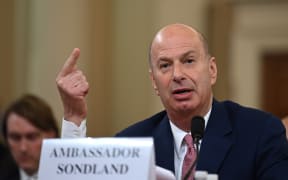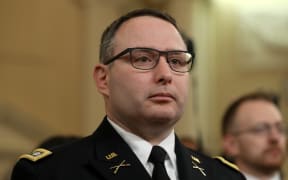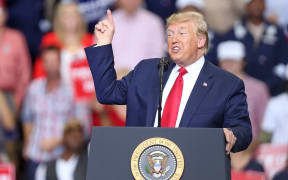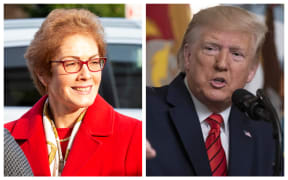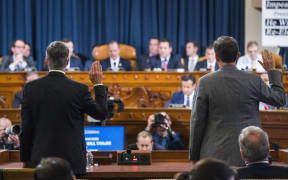President Donald Trump's former Russia adviser Fiona Hill urged lawmakers in the House of Representatives impeachment inquiry on Thursday not to promote "politically driven falsehoods" that cast doubt on Russia's interference in the 2016 US election.
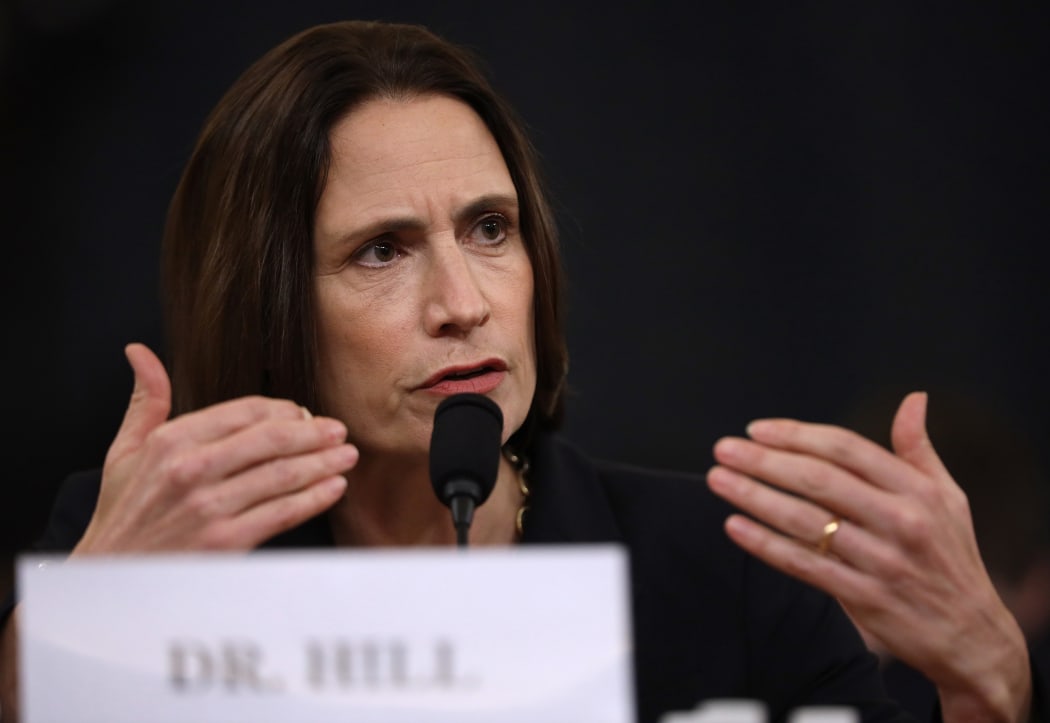
Fiona Hill, the National Security Councils former senior director for Europe and Russia testifies before the House Intelligence Committee. Photo: AFP
Dr Hill spoke on the final day of scheduled public testimony before the House Intelligence Committee probing whether Trump asked Ukraine to investigate a political rival in return for a White House meeting or the release of US security aid.
If the committee calls no further witnesses, Dr Hill's request may set the stage for the Democratic-led House's wider consideration of whether to draft formal charges known as articles of impeachment against the Republican president.
In her testimony, Dr Hill said some members of the panel appear to believe that Russia and its security services did not conduct a campaign against the United States during the 2016 presidential race, and that perhaps Ukraine did.
"This is a fictional narrative that has been perpetrated and propagated by the Russian security services themselves," said Dr Hill, who until July served as the director for European and Russian affairs at the White House National Security Council.
"In the course of this investigation, I would ask that you please not promote politically driven falsehoods that so clearly advance Russian interests," she said during the hearing, which ended after more than five hours of testimony.
The notion that Ukraine interfered in 2016 was one of two issues that the US president urged Ukrainian President Volodymyr Zelenskiy to investigate in a 25 July phone call that is at the heart of the impeachment effort.
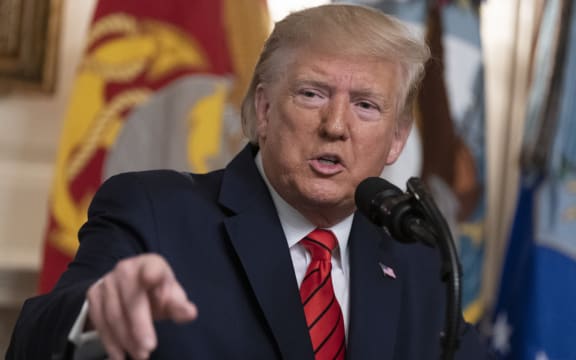
Donald Trump. Photo: AFP
Mr Trump also pressed Ukraine on the call to investigate Joe Biden, a leading contender for the Democratic nomination to face Trump in the 2020 presidential election, and his son Hunter, who had served on the board of Ukrainian gas company Burisma.
The inquiry is also examining whether Trump's temporary freeze of $391 million in security aid to Ukraine, approved by Congress to fight Russia-backed separatists in the eastern part of the country, was meant to pressure Zelenskiy to conduct the probes.
Democrats say Mr Trump's dealings with Ukraine amount to an abuse of power to pressure a vulnerable US ally to dig up dirt on a domestic political rival.
Mr Trump has denied wrongdoing, publicly criticised witnesses and described the impeachment proceedings as a "witch hunt". His fellow Republicans call the proceedings a "sham".
'Hand grenade' Giuliani
David Holmes, a staffer from the US Embassy in Ukraine, testified on Thursday that his work started to become overshadowed in March by Trump's personal lawyer, Rudy Giuliani, who was pushing Ukraine to carry out the two probes.
Mr Holmes also testified about a 26 July phone call in which he said he overheard Mr Trump ask Gordon Sondland, US ambassador to the European Union, about the status of the investigations. He said he heard Mr Trump's voice on the call at a Kiev restaurant.
"So, he's gonna do the investigation?" Mr Trump asked Mr Sondland, referring to Mr Zelenskiy, Mr Holmes said.
"He's gonna do it," replied Mr Sondland, he said.
In her testimony, Dr Hill recalled a conversation she had with Mr Trump's former National Security Adviser John Bolton about Mr Giuliani's activities.
She said she had already expressed regrets to Mr Bolton about Giuliani's "smear campaign" against Marie Yovanovitch, the former US ambassador to Ukraine, who Mr Trump withdrew prematurely from Kiev in May.
Mr Bolton, she said, looked pained and "basically indicated with body language that there was nothing much that we could do about it. And then, in the course of our discussion said Rudy Giuliani was a hand grenade that was going to blow everyone up."
Asked to elaborate on what she thought Mr Bolton meant, Ms Hill replied that what Mr Giuliani was saying was "pretty explosive" and that the former New York mayor "was clearly pushing forward issues and ideas that would, you know, probably come back to haunt us and in fact I think that that's where we are today."
US intelligence agencies and former Special Counsel Robert Mueller have determined that Russia interfered in 2016 with a campaign of hacking and propaganda intended to sow discord in the United States, boost Mr Trump's candidacy and harm his Democratic opponent Hillary Clinton.
Mr Mueller's team brought criminal charges against 12 Russian intelligence officers in the hacking effort, accusing them of covertly monitoring employee computers and planting malicious code, as well as stealing emails and other documents.
Dr Hill warned lawmakers that Russia was gearing up to repeat its election interference activities in 2020.
"We are running out of time to stop them," she said.
Like several career government officials who have testified, Ms Hill said she prided herself as a nonpartisan foreign policy expert who had served Republican and Democratic presidents.
The committee's top Republican, Devin Nunes, nonetheless took issue with her comments, saying a report by Intelligence Committee Republicans "analysed the 2016 Russia meddling campaign".
"Needless to say, it's entirely possible for two separate nations to engage in election meddling at the same time and Republicans believe we should take meddling seriously by all foreign countries, regardless of which campaign is the target," Mr Nunes said.
With no more witnesses scheduled, the hearing could mark the end of the investigation phase of the impeachment proceedings.
Once the committees running the inquiry agree the probe is complete, evidence then goes to the House Judiciary Committee to consider whether to draft formal charges, known as articles of impeachment - against Mr Trump. Democratic lawmakers say that is unlikely before the 28 November US Thanksgiving Day holiday.
If the full House then voted to impeach Mr Trump, the charges will go to the Republican-controlled Senate for a trial on whether to remove him from office. Few Republican senators have broken with the president, however.
The Senate will have to decide whether to actually hold a trial or whether to quickly dismiss any charges against Mr Trump.
Over the past few weeks, some Republican senators have voiced doubts that a motion to dismiss could be approved in the Senate, where Republicans hold 53 seats and where a handful could insist formal charges against Trump be aired in a trial.
Furthermore, some Senate aides have said that some in the White House feel that a full trial that ends in an acquittal of Mr Trump would be a better outcome than the charges being dismissed without the case first being presented to senators.
- Reuters
